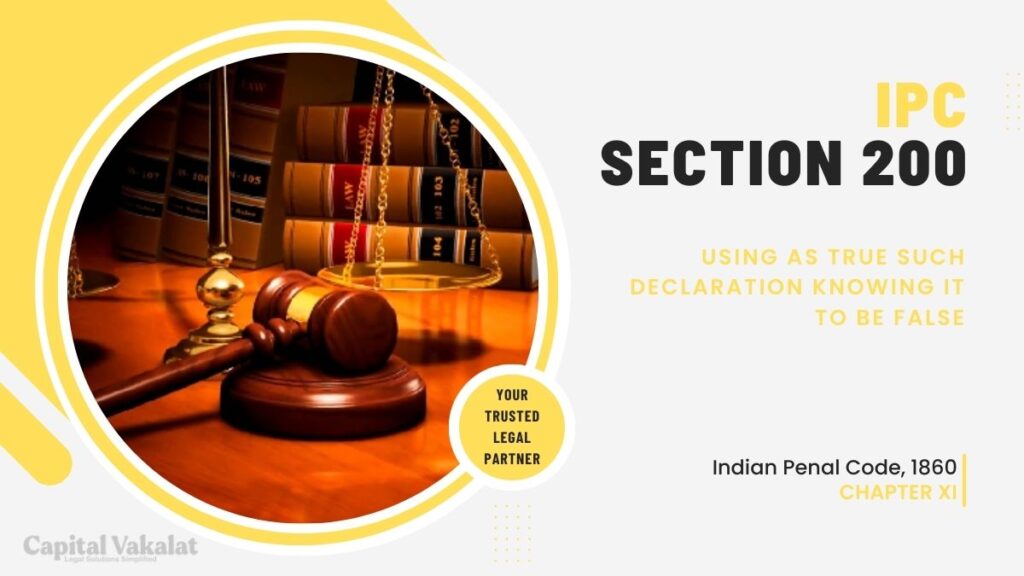In the realm of Indian law, Section 200 of the Indian Penal Code (IPC) plays a crucial role in maintaining the sanctity of legal proceedings and justice. It pertains to the use of declarations in legal matters, with a catch – knowing that these declarations are false.

In this article, we will delve into the intricacies of Section 200 IPC, its importance, and the consequences of using false declarations.
Understanding Section 200 IPC
Section 200 of the IPC deals with the act of intentionally using any declaration, statement, or document as true, when one knows it to be false. This section is primarily related to legal proceedings, where such declarations can significantly impact the outcome of cases. It is vital to maintain the integrity of legal documents to ensure justice is served.
Importance of True Declarations
True declarations are the backbone of legal proceedings. They provide a foundation for cases and investigations, allowing the justice system to function effectively. False declarations can lead to unjust outcomes and hinder the quest for truth.
Offenses under Section 200 IPC
Section 200 IPC identifies specific offenses related to the use of false declarations. It includes:
1. Fabricating Evidence
Individuals who knowingly present false evidence to the court or investigative authorities are in violation of Section 200 IPC.
2. False Affidavits
Submitting affidavits with fabricated information is a common offense under this section. Affidavits are critical documents in legal proceedings and must be truthful.
3. Misrepresentation
Making false statements or declarations to mislead the court or authorities is considered an offense.
Key Elements of Section 200 IPC
To establish an offense under Section 200 IPC, the following key elements must be present:
1. Knowledge of Falsity
The accused must be aware that the declaration is false.
2. Use in Legal Proceedings
The false declaration must be used in the context of a legal proceeding.
3. Intent to Deceive
There should be an intent to deceive the court or investigative authorities.
Penalties for False Declarations
The penalties for violating Section 200 IPC can be severe. Individuals found guilty can face imprisonment and fines. The exact punishment depends on the seriousness of the offense and the impact on the legal process.
Recent Cases
Several recent cases in India have highlighted the significance of Section 200 IPC. These cases involve high-profile individuals who have used false declarations to manipulate legal outcomes. Such cases shed light on the need for stricter enforcement of this section.
Legal Implications
The implications of false declarations are far-reaching. They not only affect the legal proceedings but also undermine the faith of citizens in the justice system. Upholding the truth is essential for a just and equitable society.
Reporting False Declarations
If you come across false declarations being used in legal matters, it is your moral and legal duty to report them. Reporting such cases can help maintain the integrity of the legal system and ensure justice is served.
Protection of Whistleblowers
Whistleblowers who report false declarations are often at risk. It is essential for the legal system to provide protection to these individuals to encourage the exposure of such wrongdoing.
Conclusion
Section 200 IPC is a vital legal provision that aims to maintain the truth in legal proceedings. False declarations can have grave consequences, and it is the responsibility of both individuals and the legal system to ensure the integrity of legal documents and statements.
In this article, we explored Section 200 IPC, its importance, and the implications of using false declarations in legal matters. Upholding the truth is essential for the integrity of the legal system and the pursuit of justice.
Frequently Asked Questions
What are the key elements to establish an offense under this section?
The key elements include knowledge of falsity, use in legal proceedings, and intent to deceive.
Are there recent cases highlighting the importance of Section 200 IPC?
Yes, there are several recent cases involving high-profile individuals that emphasize the significance of this section.
What penalties can individuals face for using false declarations?
Penalties can include imprisonment and fines, depending on the severity of the offense.
How can one report false declarations in legal matters?
One can report false declarations to the appropriate legal authorities or through established channels, ensuring the integrity of the legal system is upheld.